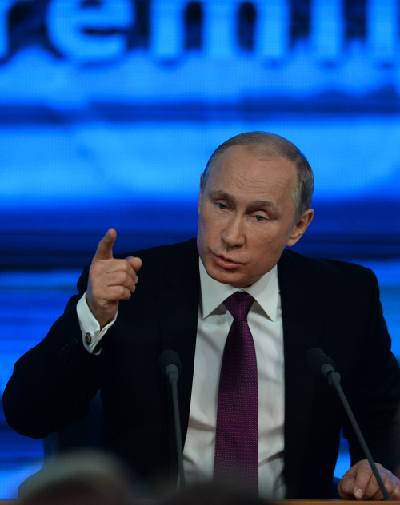 |
|
STRONG MAN: Russian President Vladimir Putin answers questions during his annual year-end press conference in Moscow on December 18, 2014, voicing confidence that Russia's economy would soon be on the right track (JIA YUCHEN) |
The Christmas holiday brought welcome relief to the embattled ruble as Russian Finance Minister Anton Siluanov announced on December 25, 2014 that the nation's currency crisis had ended. The ruble traded at 53.9 per U.S. dollar during the evening of that day, a sharp rebound from its recent all-time low of 80.
For the past months, Russia's economic foundation has been severely undermined due to the twin troubles of falling crude oil prices on the international market and rolling rounds of Western sanctions. Partly due to reactions to the crisis in Ukraine, the ruble recently saw the sharpest drop in 16 years. The fall of the ruble has prompted panic buying of foreign currency in Russia and a spike in deposit withdrawals, heaping pressure on a vulnerable banking sector whose access to international capital markets has already been restricted by Western sanctions. In the meantime, the large drop of energy prices has also caused a severe blow to the Russian economy, as oil and gas exports comprise around 50 percent of its fiscal revenue.
To turn the deteriorating situation around, the Russian Government has taken steps to support key banks and address the deepening economic recession in recent weeks, including a sharp and unexpected interest rate hike. Now, the measures are seemingly taking effect. Observers claim that Russia must address its fundamental economic flaws, adding that in the meantime, the continued sanctions on Russia hurt all.
No real crisis
Since the beginning of the ruble's sharp depreciation, the Russian Government has adopted multiple approaches in response. While Russia's central bank raised benchmark interest rates to curb the current inflation, Moscow also imposed informal capital controls, including orders to large state-controlled oil and gas exporters Gazprom and Rosneft to sell some of their dollar revenues to shore up the ruble. In the meantime, the Russian Government has significantly scaled up rescue funds for the banking sector. It has announced providing up to $2.4 billion in loans to bail out the Trust Bank, the first bank to fall victim to the crisis. In addition, the country is also planning to tax food exports in order to keep prices in check and ensure food security in Russia.
The series of steps has fostered the ruble's temporary stability. However, observers believe that Russia's difficulties stem mainly from its flawed economic structure, rather than merely problems brought about by West-imposed sanctions and the overall international environment.
Cheng Yijun, a senior researcher with the Institute of Russian, East European and Central Asian Studies under the Chinese Academy of Social Sciences, said that though severely hit by Western sanctions, the major problem of Russia's economy is its lack of structural diversity and excessively heavy reliance on the energy sector, leaving it vulnerable to fluctuations of international energy prices.
As a major energy exporter, Russia has been counting on oil and gas exports to provide nearly half of its fiscal revenue.
Chen Yu, a research fellow at the China Institutes of Contemporary International Relations (CICIR), echoed Cheng's view by adding that restructuring the Russian economy does not mean fully dropping energy-oriented development, but rather consists of attaching more importance to exports of non-energy sectors and boosting domestic manufacturing.
Cheng claimed that although Russia's economy is seemingly chaotic, it is far from crisis mode. "Compared with the crises in 1998 and 2008, Russia's current economic condition is much better," Cheng said.
According to Cheng, Russia now has a large foreign exchange reserve totaling as much as $370 billion that can be used to combat financial risks. In addition, the economic difficulties have not caused political instability in Russia--on the contrary, the Russian people have stayed calm in spite of the economic troubles.
